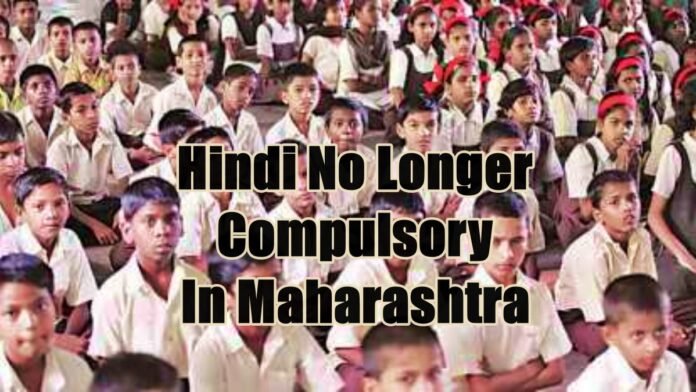
Key Points
- Maharashtra government has reversed its controversial decision to make Hindi compulsory as the third language in schools after facing significant public and political backlash.
- Students can now choose any Indian language as their third language instead of being forced to study Hindi under the revised three-language policy.
- Marathi remains mandatory in all schools across the state, regardless of the medium of instruction.
- Schools must appoint teachers if at least 20 students opt for a non-Hindi language; fewer than 20 students will receive online instruction.
- The policy applies to Classes 1-5 in Marathi and English-medium schools under the State Curriculum Framework 2024.
- Education Minister Dada Bhuse denied the revision was made under political pressure, emphasizing student choice and flexibility.
Mumbai: The Maharashtra government has made a significant policy reversal, abandoning its controversial decision to make Hindi compulsory as the third language in schools following widespread opposition from various quarters. The revised policy now grants students the flexibility to choose any Indian language as their third language, marking a victory for linguistic diversity advocates.
Minister Denies Political Pressure, Emphasizes Student Choice
School Education Minister Dada Bhuse defended the government’s decision, stating, “We have made Marathi mandatory in all schools, but no other language is compulsory. Under the three-language policy, students can choose any Indian language as their third language. Necessary arrangements will be made in schools or through online mode. This decision was not taken under pressure from any political party.”
The minister’s statement comes amid speculation that the revision was prompted by political pressure from regional parties and cultural organizations who viewed the original Hindi-mandatory policy as an imposition on Maharashtra’s linguistic identity.
Revised Policy Framework: Flexibility with Structure
The School Education Department’s revised government resolution provides clear guidelines for the implementation of the new language policy. According to the corrigendum issued under the State Curriculum Framework – School Education 2024, “Hindi will generally serve as the third language from Class 1 to 5 in Marathi and English medium schools. However, if students wish to study another Indian language in place of Hindi, they will be allowed to do so.”
This approach maintains Hindi as the default option while providing students with the autonomy to make alternative choices based on their preferences, family background, or career aspirations.
Implementation Strategy: Teacher Deployment and Online Learning
The government has outlined a practical implementation strategy to ensure the policy’s success. Schools will be required to appoint dedicated teachers for any Indian language if at least 20 students in a particular class opt for that language. For languages with fewer than 20 students, instruction will be provided through online mode, ensuring that no student is denied their preferred language choice due to logistical constraints.
This hybrid approach demonstrates the government’s commitment to both fiscal responsibility and educational inclusivity, leveraging technology to bridge gaps where traditional classroom instruction may not be viable.
Marathi Remains Non-Negotiable
While providing flexibility for the third language, the government has maintained its firm stance on Marathi education. The language will remain compulsory in all schools across Maharashtra, regardless of the medium of instruction. This decision reflects the state’s commitment to preserving its linguistic heritage while accommodating diversity.
In schools operating in languages other than Marathi and English, the three-language formula will include the medium of instruction, Marathi, and English for Classes 1-5, ensuring students develop multilingual competencies essential for their academic and professional growth.
Background: From Controversy to Compromise
The original policy announcement had triggered significant controversy, with critics arguing that mandating Hindi undermined Maharashtra’s linguistic diversity and regional identity. Opposition parties, cultural organizations, and parent groups had raised concerns about the policy’s impact on other Indian languages and the state’s federal character.
The swift revision demonstrates the government’s responsiveness to public sentiment and its willingness to prioritize educational flexibility over administrative convenience.
Future Implications: Classes 6-10 and Beyond
While the revised policy currently applies to Classes 1-5, the government has indicated that the language policy for Classes 6-10 will continue to follow provisions outlined in the State Curriculum Framework. This suggests that further consultations and revisions may be forthcoming as the policy framework evolves.




















































